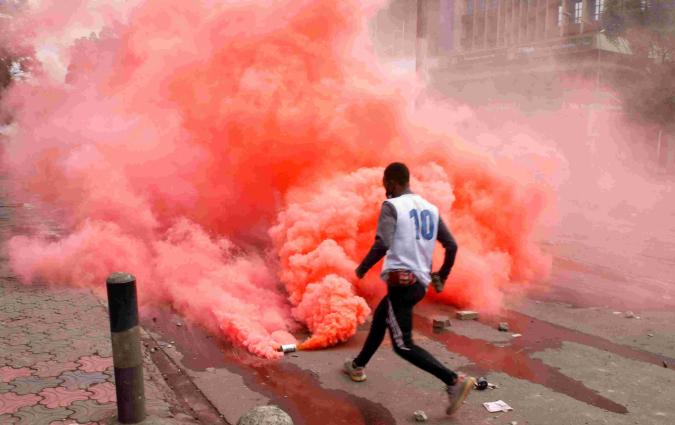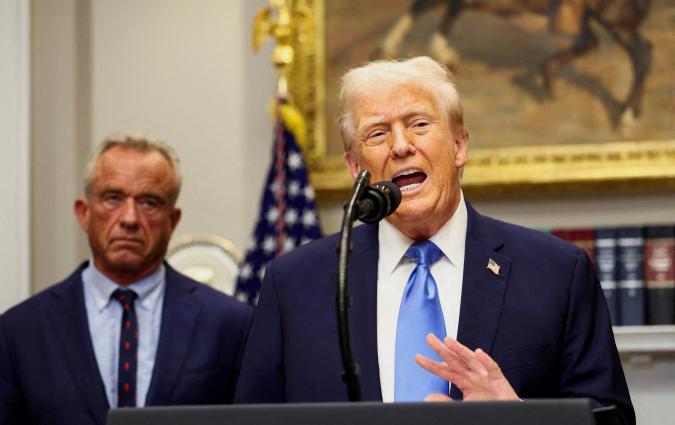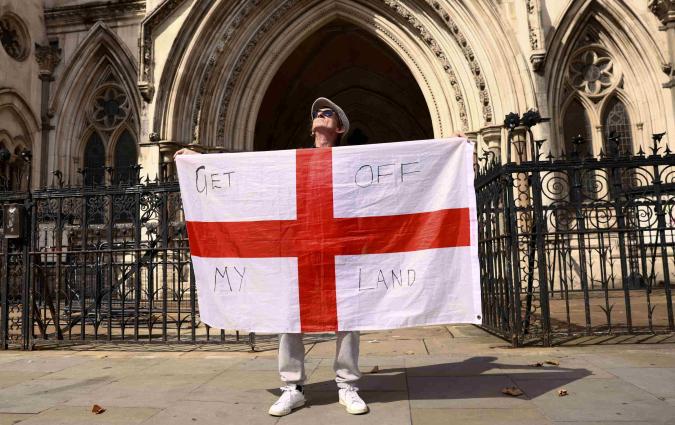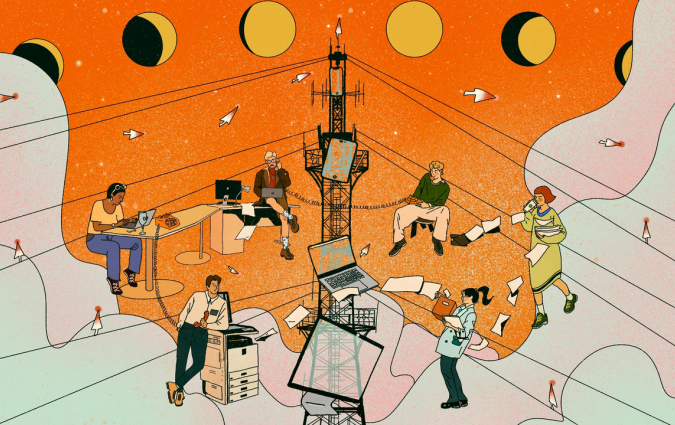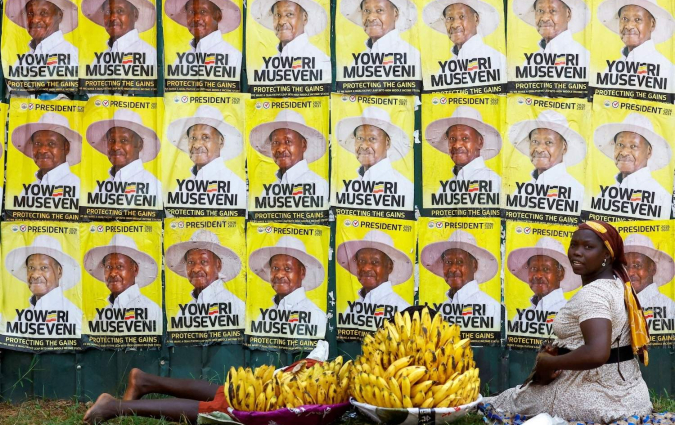A Kremlin mouthpiece at the heart of Africa: how Afrique Média helps Putin court audiences in their own language
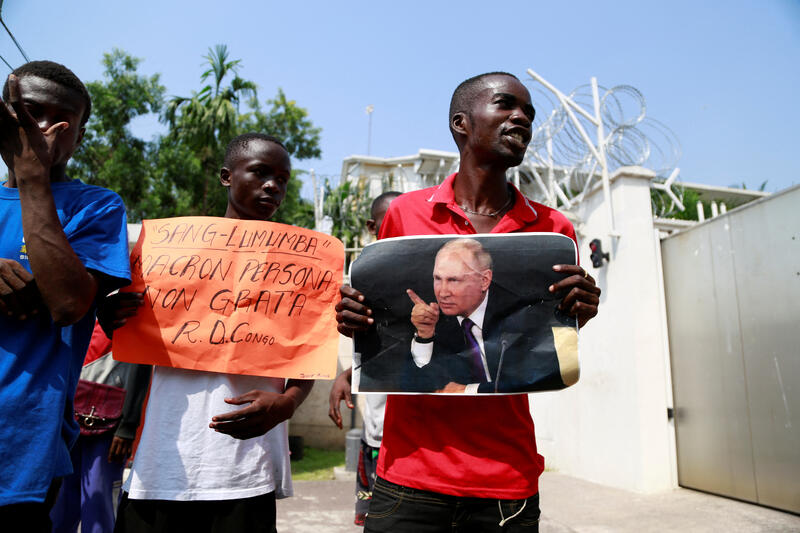
A demonstrator holds a photograph of Russian President Vladimir Putin during a a sit-in to protest against the visit of the French President Emmanuel Macron in the Democratic Republic of Congo. REUTERS/Justin Makangar
In late July 2023, the Kremlin hosted the second-ever Russia-Africa summit. Leaders of several African nations travelled to Moscow to gather with Russian leaders, including Vladimir Putin.
The summit yielded mixed results when it came to fortifying Russo-African relations. Only 17 African heads of state attended, compared to the 43 who went to the summit in 2019, a poor showing the Kremlin attributed to the interference from Western countries. However, the summit cemented Moscow’s commitment in courting the Global South as it deals with sanctions and animosity from much of the West.
One of the people who was at the summit was the head of Afrique Média, Justin Tagouh, who was photographed shaking hands with Yevgeny Prigozhin, the head of the Wagner Group who would be killed in late August in a plane crash.
While it is unclear where the Wagner Group stands with the Kremlin at this point, particularly after the death of Prigozhin, the presence of Afrique Média’s Tagouh at the summit is a reflection of the importance Russia places on media outlets to advance its agenda in the continent.
A mouthpiece for the Kremlin
Since it was launched in 2008, Afrique Média, a Cameroon-based television channel, has grown significantly – reaching millions of people on their TV screens, as well as boasting over 800,000 subscribers on YouTube and 360,000 followers on Facebook. It is one of the most influential francophone news sources in the region and is also one of the most embedded with Kremlin propaganda.
“The content of Afrique Média is the philosophy of Moscow,” says Isaac Antwi-Boasiako, a PhD Candidate and an Assistant Lecturer at the School of Media at Technological University Dublin. “Afrique Média follows Putin’s philosophy of promoting Russia’s agenda in Africa.”
This philosophy can clearly be seen in some of the outlets headlines: ‘NATO's attempts to drag Africa into the anti-Russian axis have failed miserably’; ‘The West pressured Africa ahead of summit in St. Petersburg: Kremlin’; ‘Putin after the mutiny: the West and Ukraine wanted the Russians to kill each other’.
A report by Code for Africa (CfA), a technology and data journalism non-profit based in Kenya, has tracked Afrique Média’s coverage and concludes that the outlet has been responsible for a heightened amount of coverage and amplification of the Kremlin’s messaging and pro-Wagner propaganda. The report suggests that the outlet aims to “magnify the reach and influence of the Wagner Group and the Russian state.”
Allan Cheboi, who works as Senior Investigations Manager at Code for Africa, says that by using local media outlets like Afrique Média, the Kremlin and Wagner can gain more legitimacy and more ground in the region than by spreading their message through Russian outlets like Sputnik or RT.
“You can’t convince local audiences in Africa just by speaking their language. You need to speak their tone,” he says. “People listen more and believe more when a local entity or someone who's close to you actually speaks about a particular issue.”
Why audiences engage with Afrique Média
The influence of Afrique Média extends beyond high follower counts. Cheboi says they have also tracked the number of reshares and interactions. These numbers indicate that audiences have been convinced of these narratives and support them. In today’s widespread marketplace of ideas, these influence operations yield power.
“If we look in the Sahel region, there's a lot of coups happening,” says Cheboi. “Even if these coups are not instigated by a foreign power, you see locals actually saying, ‘This is what we need to support’. They come out with Russian flags. At the moment we are also seeing North Korean flags in the Sahel region, which is interesting because we believe that that is actually because of the power of influence by entities such as Afrique Média.”
The meeting between Tagouh and Prigozhin during the 2023 Russia-Africa summit took place in the midst of a series of coups in the region, the latest ones in Niger and Gabon. Over the last few years, the Wagner Group has been known to exercise influence and prop up the military regimes of Central African Republic, Mali and Burkina Faso where the group.
Researcher Antwi-Boasiako says that the use of local media and local journalists is crucial in spreading pro-Kremlin messages. This strategy, he explains, grants Russia a bigger, more powerful megaphone because people trust these local voices and receive the messages in their own language.
Afrique Média, which brands itself as the “first pan-African multilingual news channel,” has a strong presence in Francophone Africa: “They have a large following, which means that they are a very strong mouthpiece over there,” he says. “Russia will not invite you to that summit if you are not important. There's no way.”
Wagner’s media influence
In this context, it is not surprising that Afrique Média’ executive director Justin Tagouh was seen shaking hands with Yevgeny Prigozhin. Despite the group’s attempted mutiny earlier this year, Prigozhin told Afrique Média in an exclusive interview that they were increasing their presence in Africa. After Prigozhin’s death in late August, it is not clear if Wagner’s agenda in the continent will remain the same.
According to different sources, the Wagner Group does not only carry out coups in the region and train local militias, but it also runs disinformation campaigns on social media.
Wagner associates, including Prigozhin, have appeared multiple times giving interviews to Afrique Média. Tagouh has been described as ‘the voice of Moscow’ and his foray into political summits and rubbing shoulders with powerful individuals is not new. “Moscow knows that Afrique Média promotes Russia’s interests in Africa,” says Antwi-Boasiako. “The guy was invited there as a way to say ‘thank you’ and to give him more energy to say more about Russia.”
A pro-Wagner outlet
According to the report by CfA, the narrative thread that Afrique Média weaves in their broadcasting is one that is markedly favourable to the Wagner Group and its activities in the continent.
The report explains that there has been a recent surge in the Afrique Média’s coverage of the Wagner Group and its presence in Africa, with the outlet not only extensively reporting on the group’s operations, but also extending beyond traditional media by routinely publishing pro-Wagner propaganda videos across its various social media platforms.
According to the report, Afrique Média portrays Wagner as “a successful ‘rapid response’ anti-terror solution for government partners in the Global South, with its fighters better trained than national militaries, supported by the latest technologies and weapons.”
After the death of Prigozhin in late August, Cheboi said he and the team at CfA would be keeping tabs on whether there is any reduction in terms of access to Wagner or any changes on how Afrique Média reports on the activities of the group. But he is doubtful that Prigozhin is the one directly responsible for their Wagner access and coverage tone. “There isn't any evidence available right now that there will be any changes in Afrique Média,” he says.
Beyond Afrique Média
Antwi-Boasiako points at how the news media has always been a powerful instrument when it comes to public diplomacy and foreign affairs, not only for Russia but for other influential players on the world stage. But he suggests Russia stands out with its use of propaganda in the digital age.
“Russia is spending millions of dollars to strengthen its media presence in Africa, especially since it was banned in Europe and in America because of the invasion of Ukraine,” he says. “Africa has become the next step [in their propaganda strategy].”
The state-controlled broadcast network RT, formerly known as Russia Today, has been blocked on the TV sets and on the online space of the EU, the US, Canada and other Western countries. While the outlet remains unblocked in most of the Global South, its incursion in Africa lags behind its influence in Latin America. So far, the outlet only has one RT output in the continent, RT Arabic in Algeria, but it has been eyeing its expansion in Africa since 2022.
In 2022, the network announced they were setting up an English-language bureau in Nairobi and then in South Africa. Sputnik, another Russian state-funded outlet known for parroting the Kremlin’s line, launched the French-language platform Sputnik Afrique in the same year. While RT does not yet have an explicit presence in Francophone Africa, the Kremlin’s presence in the region is felt.
Just at the end of 2022, Afrique Média announced a partnership with RT to combat “misleading Western propaganda.” On a segment announcing this partnership, a representative of Afrique Média said that “Africa and Russia have common enemies and Russia Today and Afrique Média are entering this collaboration to bring you more content about what is happening in Europe and to bring to Europe what is happening in Africa.”
There is an intersection between traditional media outlets, like Afrique Média or RT, and social media channels which combined allow for a more comprehensive reach of the population, explains Antwi-Boasiako.
“If you go, for instance, to Burkina Faso, Mali or the Central Africa Republic, the level of anti-Westernism is very high because of what they have seen on social media,” he says. “They use that platform to build among the people in Africa that the West is bad and Russia is good.”
Anti-Western sentiment cannot be blamed solely on Russian influence: the African continent has been historically victimised by the past colonial actions of Western powers.
Anti-French rhetoric is particularly salient in the former French colonies, where Afrique Média happens to also be the most active, who see France as responsible for prevailing economic stagnation in their countries. However, the Kremlin and Wagner make the most out of existing anti-Western sentiment in the region and propel their agenda further.
In addition to collaborating with local media and using their own channels to spread disinformation, Moscow has also employed a number of pan-African influencers which not only disseminate anti-Western rhetoric and justify the invasion of Ukraine, but also extoll the work of the Wagner Group in the continent.
Moreover, Afrique Média is a frequent amplifier of content coming directly from Kremlin diplomatic accounts and websites.
The report by CfA details how Afrique Média (in addition to other 40 outlets) syndicated an article by Russian President Vladimir Putin about Russia-Africa cooperation as well as an article written by the Russian ambassador to the Central African Republic on the relations between both countries. Using diplomatic sources is not a new tactic for the Kremlin, in fact, in Latin America, Russian embassies are one of the main amplifiers of the Kremlin media outlets.
What to do about Russian propaganda
While many Western countries have taken decisive steps to block Russian information networks, such as RT and Sputnik, from broadcasting and online, the same cannot be said for African countries. But Cheboi points out that blocking an outlet like Afrique Média will do little in the effort of containing propaganda.
“[The strategy should just be] basically building resilience in the audience, because even if Afrique Média ends up not being there, there will be another outlet that will crop up,” he says.
For him, the key lies in teaching media literacy and fostering education, skills that Code for Africa helps local newsrooms build by having journalists learn how to identify and report on misinformation, disinformation and propaganda across the Sahel region.
For the Kenyan elections, for example, they worked with local media outlets to demonstrate how the information ecosystem can be misused by both foreign and domestic actors to influence decision-making.
“It’s about building audience resilience to disinformation and propaganda, and educating the audience to know that there are people who benefit from you being influenced and shaped to think in a particular way,” he says.
In every email we send you'll find original reporting, evidence-based insights, online seminars and readings curated from 100s of sources - all in 5 minutes.
- Twice a week
- More than 20,000 people receive it
- Unsubscribe any time


